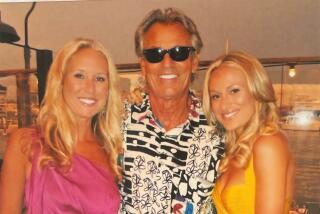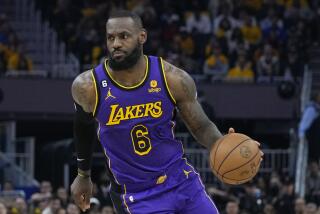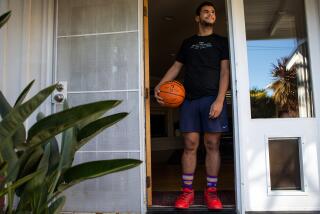He Turned a Dream Into Reality
- Share via
Like most obsessions, I would guess, Pistol Pete Maravich’s was a tough one for the owner to get a handle on.
He remembers a hot summer day in Louisiana when he was 12 and going one-on-one with his dreams.
“It must have been 105 degrees that day,” Maravich says. “It was a Saturday afternoon and I was in the gym, all by myself, as usual. I would spend 6 to 10 hours a day there.
“I remember stopping after several hours and starting to cry. I went over to a corner and started asking myself questions. ‘Other kids are out swimming and playing. Why am I here? Why do I have this desire? Why am I killing myself?’ ”
After a few minutes he put the questions aside and went back to work.
And nobody ever worked quite like Pete Maravich. He would dribble through his house blindfolded. He would take an aisle seat in the theater and dribble throughout the movie. As his father drove the family car, at varying speeds, Pete would hang out the window and dribble. One night, during a violent thundershower, he climbed out his bedroom window and dribbled through mud puddles.
When a friend bet him he couldn’t keep a ball spinning continuously for an hour, Pete spun the skin off his fingertips, knuckles and thumbs, and collected $5.
He wanted to be a great basketball player and he figured it was simple.
“If I play 10 hours a day for 10 years, and you play one hour a day for 10 years and we meet on the basketball court, you’re dead,” Maravich reasons.
That reasoning is slightly flawed. If I had practiced 10 hours a day for 10 years, and Pistol and I had met on a basketball court, I’d still be fairly dead. The kid had a gift.
In a high school JV game, the puny, 5-foot, 12-year-old Maravich threw a bull’s-eye bounce-pass behind his back, through an opponent’s legs, to a teammate for an easy layup.
He was a marvel, a phenomenon, a dazzling ballhandler and shot creator.
He had some help. His dad, Press Maravich, was a college coach who designed hundreds of ballhandling and shooting drills to keep his son-prodigy constantly challenged. They were partners in crime. They shared a dream.
“The dream was for us to try to push basketball to the furthest limits possible,” Maravich writes in his new book, “Heir to a Dream.” His vision saw the basketball court as a spawning ground for physical excitement and originality.
That was a weird concept two decades ago, unless you were a Harlem Globetrotter. In 1966, when Pistol Pete came out whirling and passing and shooting at LSU, most coaches would bench you if you dribbled through your legs, let alone through someone else’s legs.
Pistol’s coach understood. Pistol’s coach was his dad. Pistol averaged 44.2 points in his four years at LSU, more than anybody before or since.
Even when his remarkable scoring and playmaking continued in the NBA, Pete remained a misunderstood genius, a Vincent van Gogh of the hardwood. When his Atlanta Hawks played in Philadelphia, fans hung a banner: “Pistol Pete, why do hot dogs cost $2 million in Atlanta and 35 cents in Philly?”
“That banner really summed up my career,” Maravich says.
Maybe it takes a genius to understand one. When Maravich played for the Jazz, he reacted to the constant hotdog criticism one night by passing every time he got the ball. He scored only four points in the first half. The Jazz had a big lead, but Coach Elgin Baylor was mad as hell.
“What do you think you’re doing out there?” Baylor demanded.
“I’m just playing to win,” Pistol Pete said.
“Then you need to be shooting the ball,” Baylor snapped.
Pistol had other problems. Bad teams, bad knees. His mother drinking herself to death. Pete himself doing way too much alcohol-related partying.
Still, he played enough great basketball to make two All-Star team starting lineups, to win an NBA scoring title--he averaged 31.1 points in 1977--and to be named to the Basketball Hall of Fame.
After retiring in 1980, he sought replacements for his old obsession. He tried astrology, astronomy, mysticism, survivorism, nutrition, UFOs. On the roof of his home he painted a large message for passing UFOs, volunteering himself for capture. No takers. They probably didn’t dig his style on Mars, either.
Then he turned to religion. Now Pete, who just turned 40, is a born-again Christian, happily married, with two sons. He lives in rural Louisiana, does some public speaking, some TV color work, some clinics, plays in an occasional old-timers’ game.
He’s coming out with four instructional videos, “Pete Maravich’s Homework Basketball,” featuring some of the crazy drills designed by Pete and Press, who died of cancer earlier this year.
And there’s the book, a soul-searching look at maybe the most intense father-son team in sports history, two guys with a simple dream.
“I’m just trying to push the game to its limits,” Pete always told reporters.
The game would have evolved anyway, but surely Pistol speeded it along, paving the way for Magic Johnson, Michael Jordan and the others who continue the push it to its limits.
Maravich is glad to see that. He knows he made an impact but he isn’t erecting any shrines to himself. All the old trophies are packed away. Pete doesn’t even have a hoop over his garage door.
By the time Maravich was 7, he was giving his father suggestions on coaching Press’ college team. The next Maravich generation will be different. Pete’s son Jaeson, 8, went to Pete one day last year to check out a rumor he had heard at school.
“Daddy,” Jaeson asked, “did you used to be Pistol Pete?”
More to Read
Go beyond the scoreboard
Get the latest on L.A.'s teams in the daily Sports Report newsletter.
You may occasionally receive promotional content from the Los Angeles Times.










